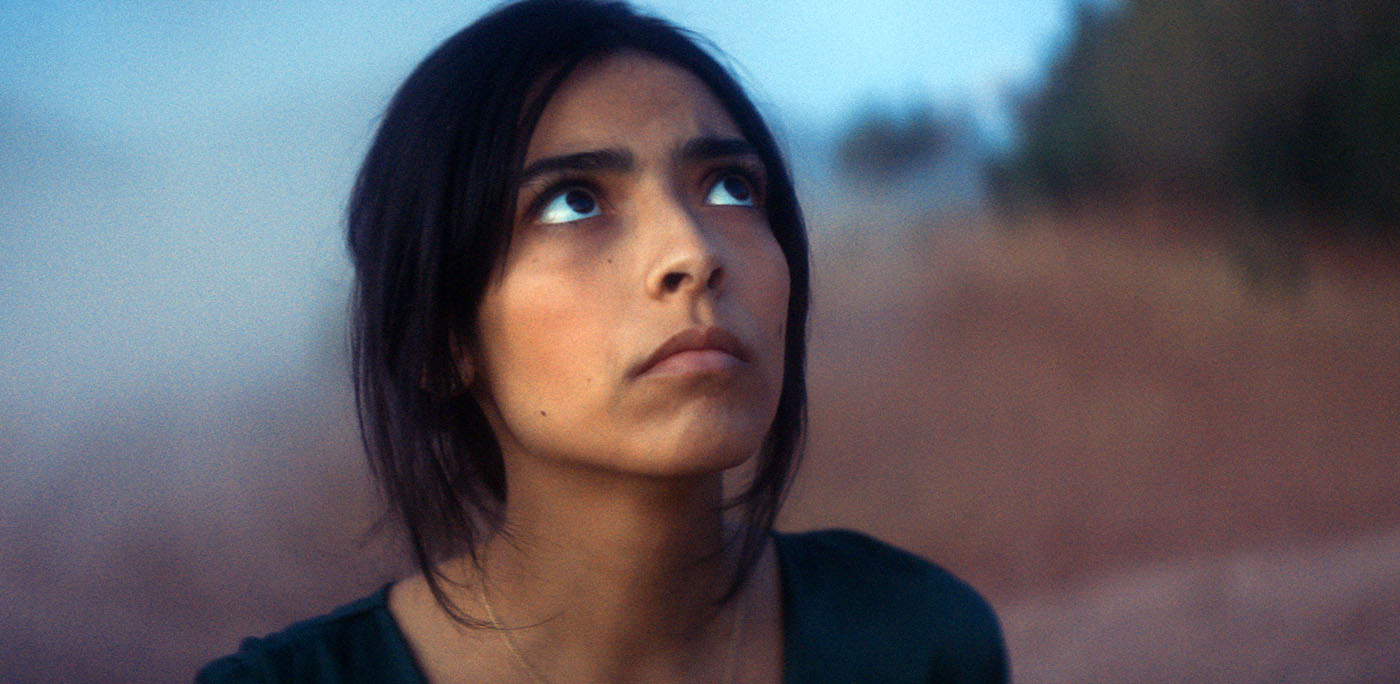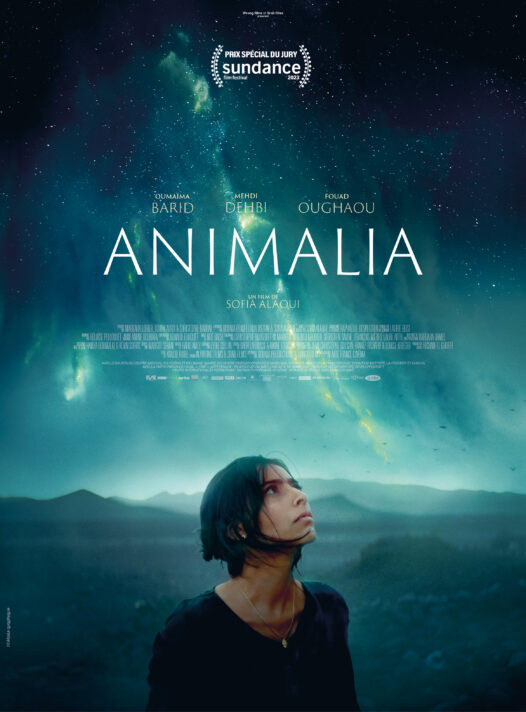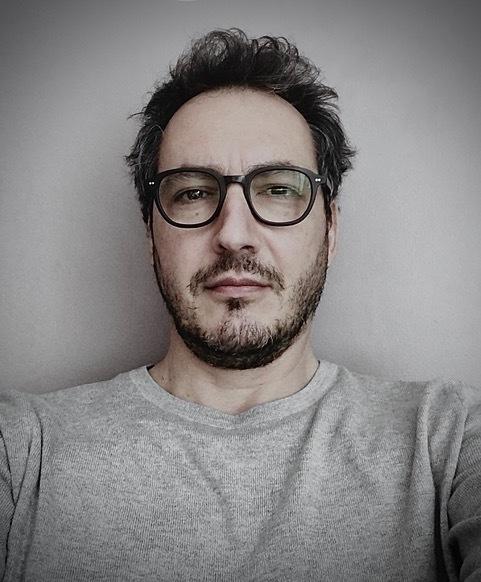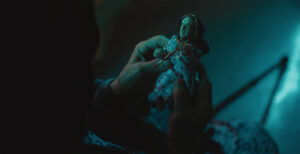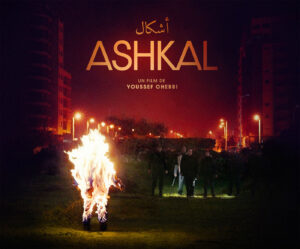The debut feature film from Sofia Alaoui, in French, Arabic, and Tamazight, is playing in France this summer, and will soon become available on VOD.
In 2021, a young Franco-Moroccan director won the César for best short film, after winning the Grand Prix at the prestigious Sundance Film Festival. Her name is Sofia Alaoui, and her film was entitled Qu’importe si les bêtes meurent (So What If the Goats Die).
Two years later, she’s returned with Animalia, her first feature film. Auspiciously, it screened at Sundance this year, where it won the Special Jury Prize. Animalia tells the story of Itto, a young Amazigh woman from a working-class background, married to the son of a caïd (local leader) from Imilchil, a small town in the Moroccan Atlas mountains. Itto is pregnant, and judging by the roundness of her belly, she’s due soon.
Amine, her young husband, is loving and attentive, but remains alienated from the bourgeois family order. He’s caught in a vice between his father, a respected but overbearing grandee, and a mother who is contemptuous of her daughter-in-law and her modest extraction, and no doubt jealous of her youth (and beauty?).
One day, while the whole family is away on a business trip, Itto decides to stay home alone in the family villa. What starts out as a quiet day suddenly turns into chaos: helicopters, armored vehicles and armed troops appear in the village (not unlike what happens in Steven Spielberg’s War of the Worlds or Marc Forster’s World War Z) and seal it off.
As mysterious phenomena take place across the country, a state of emergency is declared. Itto is distraught but overcomes her emotion with the strength of a young woman who carries life, desperately searching for a way to reach Amine.
The supernatural seems to be Sofia Alaoui’s preferred theme for telling a story. In her capable hands, it is a visual and conceptual motif that gives her the freedom to confront her characters with vital issues, which is always good for spectacle and cinema.
Here, a catastrophe seems about to devastate the Moroccan Atlas, if not the world, but never happens. The threat and tension are palpable throughout the film.
Sofia Alaoui does not explain the nature of this threat. She shows it to us just once, in a striking image of contemplative beauty, then abandons us to an opaque space where the causes remain unclear, but only the consequences are suggested.
This is what makes Alaoui’s cinema so powerful.
Already, in So What If the Goats Die, you had an agnostic film in which, through the staging of an unexplained global phenomenon, the young director gave viewers the opportunity to question their own religious or other beliefs, by bringing them face to face (or back to back). However, in Animalia, which plays on the same narrative springs, there’s something that holds in check what worked so wonderfully in the short film.
Animalia relies on characters who are more stereotypical, whose social status alone serves to characterize them (a young woman from the working class, a handsome and smooth family son, a crushing father, a mother jealous of her daughter-in-law, a selfless and courageous hotel employee). This bias makes the sociological question far too present and didactic, and the supernatural can no longer play its role as a catalyst for our reflection.
The metaphysical question, which should be revealed by the emergence of the fantastic in Itto’s daily life, is weakened by the critique of this divided Moroccan society, to which the director brings neither a completely personal nor a truly original point of view.
Oumaïma Barid plays Itto. The young actress is sometimes annoying in her intonations. She loses the thread of her performance in certain scenes, as if there were gray areas regarding the issues that run through her, creating a sense of floating, despite the vital energy that transcends her.
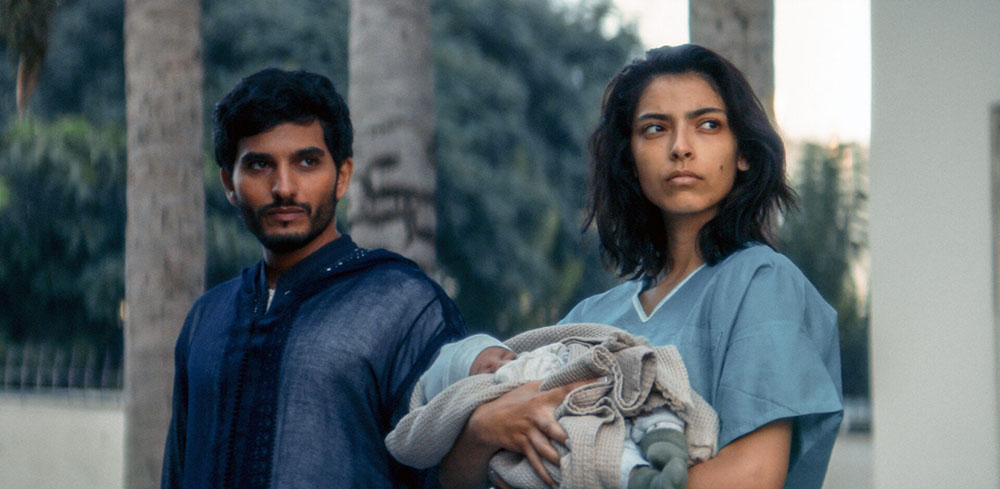
Mehdi Dehbi plays Amine, Itto’s young husband. At the start of the film, his smooth good looks fit in perfectly with the society to which he belongs, while his love for a working-class girl provides an interesting counterpoint to his character, until about three-quarters of the way through the film. Then his role changes, and the anomaly of their love fades away: he reverts to the detestable character he resembles and should always have been.
On the other hand, we are delighted to see Fouad Oughaou, the magnificent young actor from So What If the Goats Die. Here, he plays a hotel employee who helps Itto reach Amine. He’s the only one who portrays his character with density, without effect. He doesn’t need much text for that. Fouad Oughaou radiates with his magnetic gaze and sovereign presence. He is the Morocco of the desert, of the villages, and of the people. All this is reflected in his posture, his gait, his eyes.
The question of the relationship between the sexes also seems to be raised in the film, but in a cryptic way. Of course, the main character is a woman expecting a child and struggling to survive in an almost exclusively male environment. The threat posed by paranormal phenomena can be seen as the more obvious threat posed by a lone young woman seeking to break free from tradition, in a society that is still archaic for a whole section of its population (the sequence in which Itto prepares to spend a night alone in a hotel populated by men is unequivocal).
What do the animals have to say in Animalia? What do they have to teach us? Are they the sentinels of our world, which is coming to an end? Or are they the main threat? There’s a darkness of meaning in Animalia that overlaps with the meteorological mystery that threatens the world. The function of the animals announced by the film’s title leaves us wanting more. At times, we’re reminded of Alfred Hitchcock’s The Birds (1963), but very quickly a new shot replaces the previous one, another sequence arrives, sending the animals away long before our curiosity is quenched.
Dogs, birds and sheep roam here and there in the country, agitated by irrational attitudes, to which Itto seems to be the only witness.
Animalia is a road movie in which Itto, pregnant with Amine’s child, tries to get to her husband on Fouad’s scooter – the man who decides to help her on her quest. On the chaotic paths of the Atlas mountains, the threat is also a domestic one. The omnipresence of the fetus in utero, even if not dealt with by the director, makes us fear the worst for the baby she’s carrying, throughout the arduous journey to the father. So there’s another, more unconscious, deeper level to Animalia, one that seems to elude its director.
At the screening of the film at the Champs-Élysées Film Festival, Sofia Alaoui was present with her newborn in her arms (I mention this not only because the young director showed up to the screening with her baby, but also because I see a direct link between Itto’s character and the film’s director). So does that mean we can look at the film through the prism of motherhood and wonder at what Sofia Alaoui is talking about?
If the strangeness of her short film leads audiences towards a simple metaphysical dilemma, contrasting the Cartesian, the mystical and the supernatural, forcing viewers to confront their beliefs, Animalia succeeds in dealing with strangeness from the subjective point of view of Itto, a mother-to-be. And the child she’s carrying is itself a form of strangeness — in essence she’s carrying a foreign body inside her, and suddenly everything around her seems stricken with the supernatural, the unexplained, the agonizing.
Roman Polanski’s Rosemary’s Baby (1968) already showed the existential anguish of an expectant mother (Mia Farrow) and the benevolent incomprehension of her husband (John Cassavetes) as they awaited their first child — a terrifying film that transformed a simple event into a universe of horror and anguish.
Does Sofia Alaoui have her own way of talking about motherhood? Is her film informed by the doubts, emotions, fears and anxieties she herself was experiencing at the same time as her character? Of course, we’d have to know whether the writing of her film coincided with the nine months of gestation, but I’d tend to think so, because it’s here, for me, that Animalia reveals itself to be special, intimate and rich.
Pregnant Itto on screen and Sofia Alaoui as a young mother facing the audience: a powerful mirror effect that may reveal the hidden meaning of the film and all its clarity…The unheard-of power of motherhood on a (pregnant) woman’s imagination, the total incomprehension of men in the face of this event, the radical ontological gap between the two sexes that can lead to irreconcilability.
In Animalia Sofia Alaoui recounts that fantastic moment when a woman carries life, when she is about to give birth, when she is (both? dual?), and when, all around her, the world takes on a new dimension, quasi-sacred, quasi-divine and yet absolutely natural, almost…animalistic.



